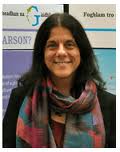4th Dec 2014: One Brain, Two Languages; Bringing Up a Bilingual Child by Madeleine Beveridge

Come along to The Counting House at 7pm to listen to Madeleine’s talk. Share a crust of bread, and hear the reflections she has to share…
Title of talk:
One brain, two languages: bringing up a bilingual child
Bullet points of what you would like to talk about:
- What worries do people have about bringing up a bilingual child?
- What are these concerns based on?
- What does research tell us about whether or not these concerns are justified?



